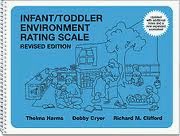The Companion to the Quality Standards (the booklet with the Red title bar) lists the 100 points. You all received this with your welcome packet and it is also online here http://del.wa.gov/publications/elac-qris/docs/EA_facility_companion.pdf
There are 100 possible points. The number of points you are assessed will determine your Early Achievers level.
If you are assessed 70-90 points, you will be Level 4
If you are assessed 91-100 points, you will be Level 5
Here is how the points break down.
The Environment Rating Scale is worth up to 15 points. When the UW does the ERS assessment, they will average the scores from each classroom assessed. If the average is a 4, you will get 5 points. If the average is a 5, you will get 10 points. If the averages is a 6+ you will get all 15 points.
You will find this on the top of page 14 of the Companion.
The CLASS assessment (the one done via video) is worth up to 40 points! This is a biggie for sure! You will find this on page 13 of the Companion.
The CLASS is divided into 2 parts, each worth up to 20 points. For the Emotional Support and Classroom Organization/Emotional and Behavioral Support sections, if you score an average of 3.5-4.9, you will get 10 points; if you score an average of 5.0-5.9, you will get 15 points; and if you score an average of 6.0+ you will get 20 points. You will find this on the bottom of page 13 in the Companion.
The other part of the CLASS assessment is also worth 20 points. The Instructional Support/Engaged Support for Learning part of the CLASS sets the bar very high and looks at advanced skills. Because it is a high bar, the point threshold is a bit lower. If you score 2-3.4 you will get 10 points, if you score between 3.5-4.4 you will get 15 points, and if you score 4.5+ you will get all 20 points. You will find this on the top of page 13 in the companion.
So the possible 15 points from the ERS plus the possible 40 points from the CLASS gets us up to 55 of the 100 points.
If you look on pages 17 and 18 in the Companion, you will see the 10 points for Professional Development. Once you have all your staff’s professional development listed in MERIT, you will have a pretty good idea of where your score will be in this section.
That leaves 35 other points. Those are the total of all the little items included in the companion. One point for this, 2 points for that…
Next month, our staff will be meeting with the DEL and UW to go over more of the details of these 35 points. The way they are listed in the companion is quite ambiguous. As soon as we get clarity on this, I will be sure to detail it to all of you.









